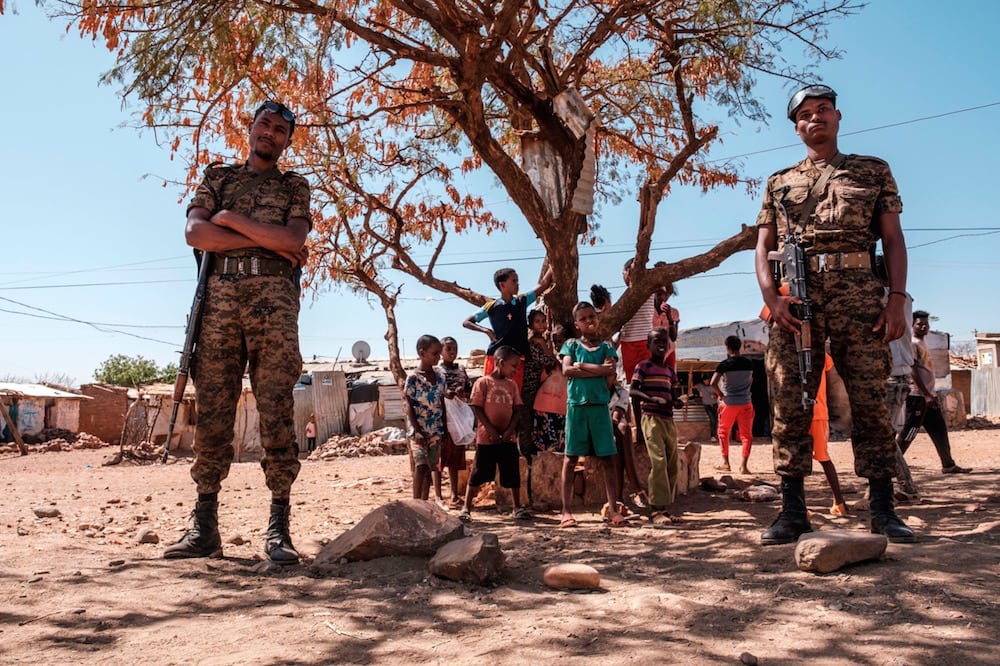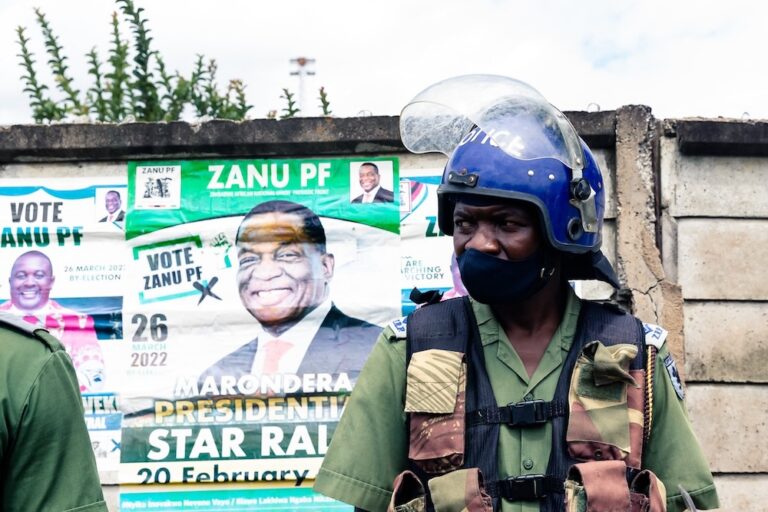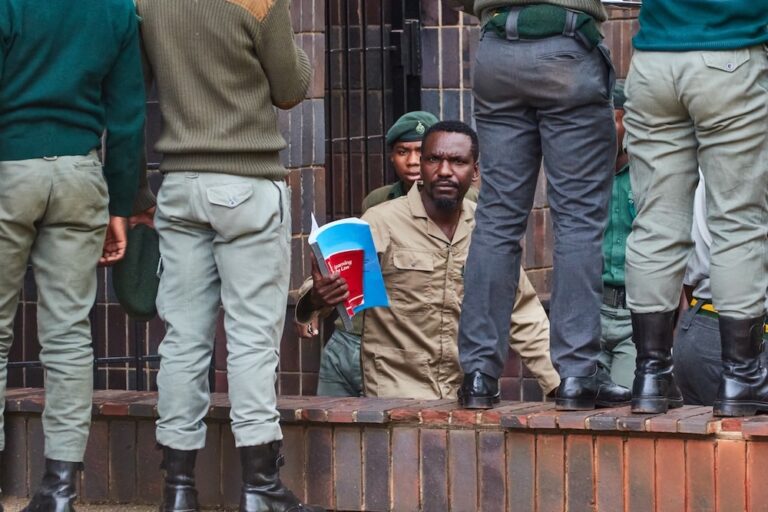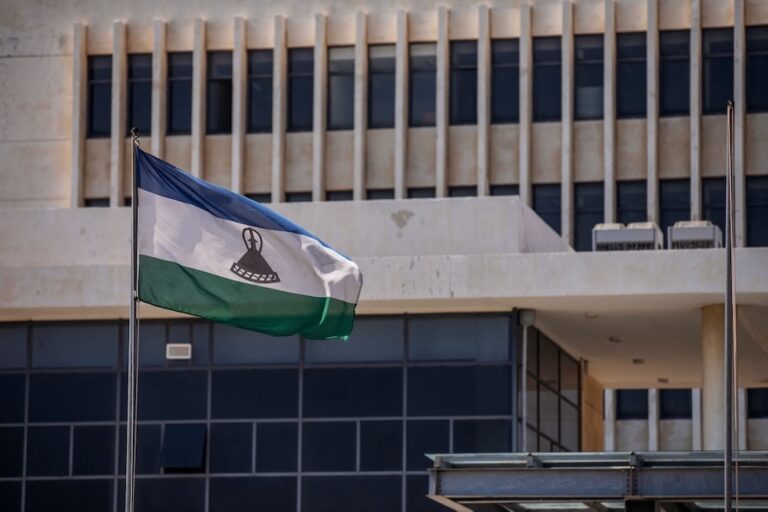January 2021 in Africa: A free expression roundup produced by IFEX’s regional editor Reyhana Masters, based on IFEX member reports and news from the region. An audio discussion relating to this piece is available here.
The media sector in Africa entered 2021 on a sombre note, sealed with a short, sharp message from the director-general of UNESCO, Audrey Azoulay, condemning the death of Ethiopian journalist Dawit Kebede Araya and calling for an inquiry into his murder.
“I condemn the killing of Dawit Kebede. I call on the authorities to investigate this crime and bring its perpetrators to justice. Impunity must not be allowed to embolden those who use violence to stop journalists from doing their job.”
Kebede Araya (not to be confused with the award-winning journalist and managing editor of Awramba Times Dawit Kebede) worked at the state-owned broadcaster Tigray TV. Kebede Araya and his friend Bereket Berhe were found in his car, which was parked just 100 metres from his house, by churchgoers, in the early hours of 20 January. Kebede Araya and Berhe had both been shot in the head.
The Ethiopian Human Rights Commission, an independent oversight organisation headed by Daniel Bekele, alleges that unspecified government security forces killed Kebede Araya and Berhe, supposedly for violating the region’s dusk-to-dawn curfew. During an interview on state television, the head of Tigray’s interim administration said that officials were carrying out an investigation, reports CPJ.
The immediate questions are: who killed him, and why? The International Federation of Journalists (IFJ) joins CPJ and UNESCO director-general Azoulay in demanding a thorough and independent investigation into his murder and for those responsible to be held to account.
Ethiopia’s war of narratives
The scant information in relation to Kebede Araya’s killing in Tigray’s capital city of Mekelle, highlights the information blackout and lack of access to the area, following the Ethiopian Federal government’s military incursion into the Tigrayan province in November last year.
Adding to the multi-layered texture of what Moussa Faki, the chairman of the African Union Commission says is “legitimate” military action, is Eritrea’s role in what critics describe as a butchering of civilians.
Claims by Prime Minister Abiy Ahmid that his federal government has won the war, that the conflict is over and that all is well, is strongly disputed by aid agencies, activists and the media. A worsening humanitarian situation with deteriorating services, food shortages, internal displacements, widespread looting, brutal assaults and sexual violence is confirmed by the United Nations Office for the Coordination of Humanitarian Affairs (UNOCHA) report published on 6 January.
However, this clampdown on critical communication goes deeper.
It is being bolstered by a war of differing narratives which has had a profound impact on the Ethiopian discourse and more critically on citizens. An in-depth analysis in the Addis Standard published in September 2020 provides context and understanding of the pitfalls of Ethiopian elites’ war of narratives. “The elites with the loudest voices use low-trust and high-reach communication mediums like Facebook, Twitter and other social media to peddle their own facts and pursue their own agenda.”
The writers Shemelis Mulugeta Kene and Solen Feyissa point out: “The emerging Ethiopian elites in both camps have harnessed social media in ways that have yielded extraordinary influence and power over political discourse that directly and indirectly affects the lives of everyday Ethiopians.”
Murdered Ghanaian journalist Ahmed Hussein-Suale remembered
The Ghana Journalists Association (GJA), Reporters Without Borders (RSF), IFJ and CPJ marked the two-year anniversary of Ahmed Hussein-Suale’s death by demanding justice for his murder.
An IFJ statement described Hussein-Suale as a “brave investigative journalist … who paid the ultimate price for his work.” The statement went on to say that the “material and intellectual perpetrators of his killing remain free … this is unacceptable”.
It echoes the call made by United Nations experts last year: “If a climate of impunity is permitted to prosper in the face of attacks on journalists around the world, we can expect this trend to proliferate, with disastrous consequences for press and media freedom globally.”
Digital platform on the safety of journalists in Africa
In this context, what could be more timely? Attendees at the digital launch of the Platform for the Protection of Journalism and Safety of Journalists in Africa were reminded of increases in attacks on the media, assaults, unsolved murders of journalists, and impunity, as well as the specific case of missing Mozambican journalist Ibraimo Mbaruco.
Set up by the African Editors Forum (TAEF), the UNESCO Addis Ababa liaison office to the African Union (AU) and the United Nations Commission for Economic Commission for Africa (UNECA), the platform is similar to the one set up by the Council of Europe. As UNESCO explains: “The platform will perform real-time monitoring, reporting and follow-up actions by both the duty and right bearers, in order to hold the perpetrators of violence against journalists and media outlets accountable for such violations. It aims is to contribute to the achievement of the expected results in the amended Declaration of Principles on Freedom of Expression and Access to Information in Africa (2019) and the UN Plan of Action on the Safety of Journalists and the Issue of Impunity.”
Speaking during the launch, Edetaen Ojo, in his role as chairperson of the steering committee of the African Freedom of Expression Exchange (AFEX), advocated for consistency and standard-setting in the documentation and presentation of facts relating to attacks on journalists. He advocated for media freedom partners to find ways to support campaigns on journalists’ safety, to prevent attacks on journalists, end ongoing attacks, provide respite for journalists under attack and ensure accountability for attacks that have taken place.
Rwanda’s UPR process
Rwanda’s human rights record went under the microscope during the UN Human Rights Council’s Universal Periodic Review (UPR) process on 22 January, with several concerns raised. “Countries across all regions called on Rwanda to end torture and ill-treatment, and investigate cases of extrajudicial killings, enforced disappearances, arbitrary detention, and deaths in custody,” reported Human Rights Watch.
In its submission, HRW highlighted harassment and threats against independent media, a constricted political space, and the suspicious deaths and disappearances of real or perceived government critics going unpunished. A comprehensive report by Amnesty International outlined similar issues and offered a range of recommendations for the Rwandan government to consider.
South African media tackles attacks, gag orders and infodemic
January was an eventful month for South Africa, ranging from online personal attacks against journalists, to the country’s advertising regulator banning a beer advert for entrenching toxic masculinity, to Twitter blocking the accounts of an editor and popular regional publication The Continent.
As the country grapples with a new local strain of the coronavirus, fact-checking site AfricaCheck has been working in overdrive to sift through polluted information to reassure the public that COVID-19 vaccines will not modify human DNA, or that China did not recover without taking vaccines. The South African National Editors Forum (SANEF) warned the media that with the growing number of government officials, political representatives and individuals turning to internet platforms and media outlets to exert influence, outlets had a responsibility to debunk misinformation, disinformation and fake news about COVID-19.
The personal and taunting online attacks by Zimbabwe’s ruling party official Tafadzwa Mugwadi against the South African public broadcaster’s foreign news editor, Sophie Mokoena, prompted SANEF to call “on the leadership of the Zimbabwe African National Union – Patriotic Front (ZANU-PF) – to step in and discipline its Director of Information and Publicity, Tafadzwa Tuboy Mugwadi. The attacks, described as misogynistic and sexist, were also condemned by the Coalition For Women In Journalism (CFWIJ).
Just 10 days later, popular South African television and radio personality Somizi Mhlongo went on a verbal rampage against Kabelo Khumalo of Sunday World and Julia Madibogo of City Press. Madibogo had questioned him on the status of his marriage while Khumalo had queried the reason his cooking show Dinner with Somizi had been put on hold. Instead of responding, he insulted both reporters on his Instagram account and revealed their contact details, in a post which he has since deleted. His fans flooded the two journalists with threats and insults, and threatened their families. In a video that he posted, Somizi was unrepentant.
South Africa’s advertising regulator has ruled that Windhoek beer must withdraw or amend its TV campaign on the basis that it entrenches toxic masculinity. The Advertising Regulatory Board (ARB) called out the Windhoek beer ad for entrenching toxic masculinity through its suggestive catchline “real men drink real beer”. It further entrenched the notion that by having a “gentle looking” man succumb to the pressure of “macho” movie star Gerard Butler,” reports The Business Insider.
In Brief
Investigative journalist Ibanga Isine has been forced to go into hiding following the death of several sources linked to his series on intercommunal conflict in Nigeria’s Kaduna state. He is worried he too may be a target. The International Press Centre is concerned, and called on the Nigerian government to take measures to ensure that his safety is prioritised.
According to Tom Bowker’s legal team, threats to expel the British journalist from Mozambique are “absolutely illegal”. Bowker was called into Mozambique’s Migration Services on 25 January, and told that he would have to leave the country over the weekend. The order for the expulsion – the first of a foreign journalist in more than 30 years – was based on a complaint by the government information office.
Freelance journalist Ahmed Mohamed Salem Kerkoub was detained by the administrative and regional authorities of Nouadhibou, following a complaint by the deputy mayor of Mauritania’s second major city. The authorities also placed Mohamed Haibeitna Delchoul and Bilal Abdarrahmane under judicial supervision for assisting Kerkoub with collation of information and fact-checking.
There were a number of assaults against journalists from across the region during January.
Police officers in Lilongwe, Malawi, attacked Henry Mhango, a correspondent for The Telegraph (United Kingdom) and BBC Africa Eye, for filming the enforcement of COVID-19 restrictions. Mhango attempted to seek permission to take pictures, but was ignored.
Three Nigerian photojournalists – Olatunji Obasa, Olu Aremo and Mudashiru Atanda – were harassed and assaulted by police while reporting on the chaotic roll out of the country’s mandatory linking of SIM cards to national identification numbers.
A news crew from Kumasi-based LUV FM accompanying a government Environmental Sustainability Taskforce to report on illegal mining activities in the mineral-rich Ashanti region of Ghana were assaulted by a group of soldiers and private guards.
New & Noteworthy
Award-winning Zimbabwean novelist, filmmaker and playwright, Tsitsi Dangarembga was awarded the PEN International Award for Freedom of Expression 2021 on 13 January. The author of Nervous Conditions also received praise for her more recent novel, This Mournable Body, which was shortlisted for the 2020 Booker Prize.
If you enjoyed reading this piece, check out the related episode of Africa Brief, our monthly audio discussion with IFEX Regional Editor Reyhana Masters about some of the key issues impacting Africa’s free expression landscape. We recorded this episode on Thursday 11 February:



